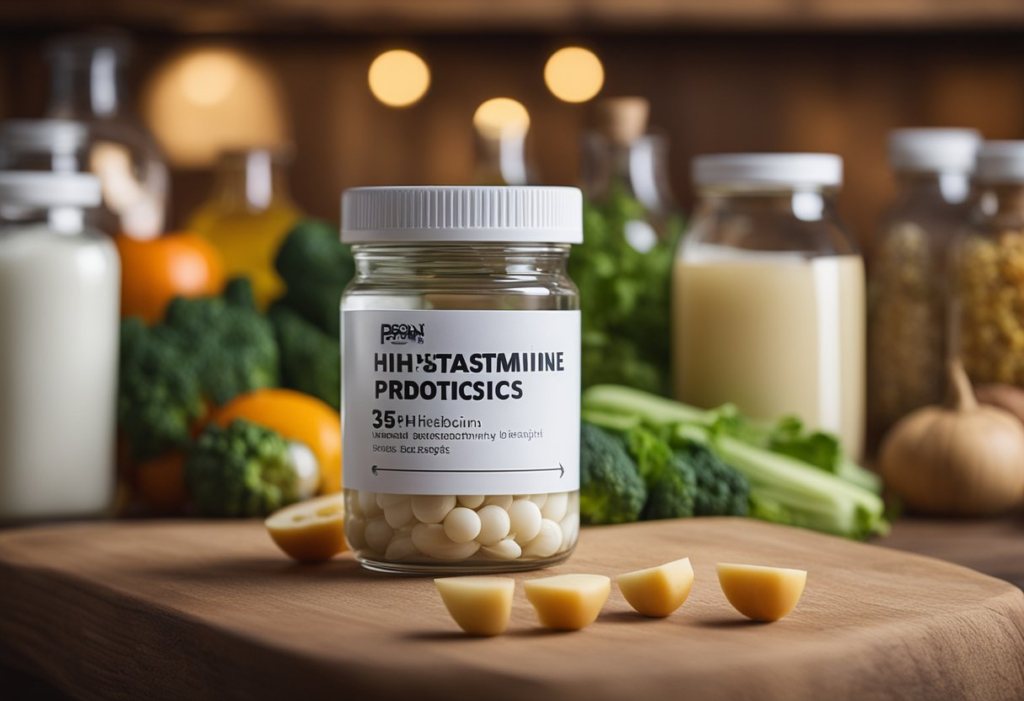Does your probiotic supplement disagree with you? What about fermented foods like cheese, yogurt, and soy sauce? And, are you reaching for the tissue box and painkillers after a glass of your favorite wine?
Many people with histamine intolerance find they can’t tolerate foods and supplements usually recommended for gut health. When they eat them, their immune system is triggered causing a wide range of symptoms.
As our understanding of this condition evolves, the role of gut health—specifically probiotics—has come under the microscope. This article explores the intricate relationship between histamine intolerance and probiotics, shedding light on how these beneficial bacteria can help those struggling with histamine-related issues or worsen their condition.
Understanding Histamine Intolerance

Histamine is a biogenic amine, a chemical naturally produced by your body. It has several important roles, including regulating stomach acid production, acting as a neurotransmitter, and triggering immune responses.
What you eat and drink adds to your system’s histamine. It is found in some foods like cured meats, bone broth, and mushrooms. Other foods such as pineapple, peanuts, and chocolate stimulate the release of this sometimes-problematic chemical.
In addition, some of the bacteria in food and living in your gut convert the amino acid, histidine, to histamine, further increasing histamine levels in your system.
Once histamine has had the desired effect in your body it is usually deactivated, broken down by the enzyme, diamine oxidase (DAO). However, in some people, there is an imbalance between histamine accumulation and the body’s ability to dispose of it. The result is histamine intolerance.
This imbalance is caused by factors such as genetics, an unhealthy gut microbiome, and certain medications. Common symptoms of histamine intolerance include headaches, skin rashes, digestive issues, and in severe cases, difficulty breathing.
The Role of Gut Health in Histamine Intolerance
Did you know that there are over 100 trillion bacteria living in your gut? This diverse colony of microorganisms is called your gut microbiome. It is essential for gut health and has an impact in almost all parts of your body, influencing your overall well-being.
Maintaining the ideal balance of gut bacteria is critical for your health, and even more important if you have histamine intolerance.
In people with histamine issues, the type of bacteria in the gut can worsen your symptoms and even be the underlying cause of your histamine intolerance.
A healthy gut contains a balance between bacteria that produce histamine and those that degrade it. As such, the gut microbiome plays a crucial role in histamine regulation.
However, when this balance is disrupted (a condition known as gut dysbiosis), it can lead to excessive histamine production or reduced histamine breakdown.
Gut dysbiosis can occur due to factors such as a diet low in fiber and high in processed fat and sugar, stress, antibiotic use, or underlying health conditions. This imbalance can worsen histamine intolerance symptoms by increasing histamine levels in the body.
Probiotics and Their Effects on Histamine Levels

Probiotics are live bacteria that have both gut and overall health benefits when taken in the right amounts. They include various strains, each with unique properties and effects on the body.
When it comes to histamine intolerance, probiotics can be a double-edged sword. While they are known for improving gut health, reaching for the wrong one can have dire consequences.
For people with the condition, low histamine probiotics may offer several benefits. Some strains can help restore balance to the gut microbiome, enhance the gut barrier function, and even directly break down histamine. This can lead to reduced histamine levels and improved symptoms.
However, using the wrong probiotics can have the opposite effect. Most common probiotic strains produce histamine, which is a natural process that doesn’t impact completely healthy individuals.
However, if you do have histamine intolerance, the increased histamine release from these probiotics can potentially trigger or worsen your symptoms. This issue highlights the importance of choosing probiotics carefully when dealing with histamine intolerance.
Choosing the Right Probiotics for Histamine Intolerance
When you have histamine intolerance it is crucial to choose the right probiotic supplement. Avoid products containing bacterial strains known to increase histamine levels in the body, including Lactobacillus casei, Lactobacillus bulgaricus, and Streptococcus thermophilus.
On the other hand, bacteria such as Bifidobacterium longum, Lactobacillus plantarum, Bifidobacterium infantis, and Lactobacillus rhamnosus, among others, are recognized as beneficial strains, helping to lower histamine levels in the body and reduce symptoms.
These bacteria help manage histamine intolerance in different ways. For example, Lactobacillus rhamnosus GG, in specific, may reduce the sensitivity of histamine receptors as well as the production of histamine from mast cells.
Lactobacillus plantarum may promote the breakdown of biogenic amines, including histamine, and Bifidobacterium longum degrades histamine and may help control the inflammatory response common after eating.
The quality and source of your probiotics also matter. Only buy products from reputable brands that provide detailed information about their strains and manufacturing processes.
It’s also best to look for probiotic supplements that are tested by a third party for purity and potency to ensure you’re getting what’s advertised.
It’s important to note that the effects of probiotics can vary between individuals. What works for one person may not work for another, highlighting the need for a personalized approach.
Finding the Right Probiotics
Managing histamine intolerance is complex and multifaceted. Two key factors are following a low histamine diet—eliminating foods high in histamine and those that promote the production of histamine—and taking the right low-histamine probiotics to restore gut health and help reduce histamine levels.
While the right probiotics can potentially help relieve symptoms by promoting a healthier gut environment and directly influencing histamine levels, the wrong ones can worsen the condition.
For those dealing with histamine intolerance, probiotics should be approached with caution and ideally under the guidance of a healthcare professional.
A personalized strategy, considering individual symptoms, gut health, and overall medical history, is key to successfully navigating the use of probiotics in managing histamine intolerance.

Jean Smith is a fitness enthusiast and blogger who focuses on fitness and a healthy lifestyle. She is passionate about assisting people in living healthier lifestyles and is constantly on the lookout for new and creative methods to stay fit and healthy. Her articles are excellent resources for anyone interested in improving their health and fitness.
